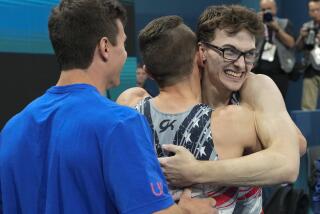Fifty years ago, Ralph Boston leaped his way into history
- Share via
It probably wouldn’t have been such a big deal if Ralph Boston had broken anyone else’s world record.
If he hadn’t eclipsed the long-jump mark held by the great Jesse Owens, the last of Owens’ world records still on the books, the feat might not have registered quite so loudly.
It certainly wouldn’t have transcended track and field.
But break Owens’ record he did — 50 years ago this month, in an extraordinary meet at Mt. San Antonio College — and just like that Ralph Boston was somebody.
“It changed my life,” he says.
No longer was he simply an Olympic qualifier from Laurel, Miss., a medal contender in the upcoming Rome Olympics.
“Now I’m a world record-holder and the favorite,” says Boston, a farmer’s son and the youngest of 10 children. “I became a name that was fairly recognizable.”
So recognizable that a few days later in New York, where the U.S. team was processed en route to Rome, Boston says he was stopped on the street by a fellow Olympian.
“He’s got a camera and he says, ‘Ralph Boston, I want to take your picture,’ and he snaps it,” Boston says of the memorable encounter. “I said, ‘Who are you?’ and he said, ‘You don’t know me now, but you will. My name is Cassius Marcellus Clay.’ ”
A tall, lean biochemistry major at Tennessee State, Boston went on to break the world record five more times over the next five years, in 1961 becoming the first to jump 27 feet.
He won three Olympic medals: gold in Rome, where he broke the oldest of Owens’ Olympic records; silver in Tokyo four years later; and, in 1968, bronze in Mexico City, where he was warming up when Bob Beamon set a long-jump record that would stand nearly as long as Owens’.
Boston, 71, later was a television sports broadcaster, assistant dean of students at the University of Tennessee and co-owner of a CBS TV affiliate in Knoxville, Tenn.
Divorced and a great-grandfather, he lives outside Atlanta and is “just kind of enjoying life as much as I can,” he says. His autobiography will be published this fall.
“You always would like to end up with a truckload of gold medals,” Boston says of his athletic career, “but I learned a lot about life and made just a whole parcel of friends.”
Fifty years ago, of course, Boston was still finding his way.
In 1959, he’d given little indication that he was an Olympic medal contender, much less a threat to Owens’ records, finishing third at the U.S. championships.
“There were jumps that said, ‘There’s something here,’ ” he says, “but I could never quite put them together. In ‘60, there was some improvement and then everything kind of came together when I hit the big time at the Olympic trials.”
Weeks later, he took another giant leap at Mt. SAC.
In a so-called “conditioning meet,” a final tuneup for Americans before they left for Rome, Boston set the tone for an incredible night of record-breaking performances by flinging his slender body 26 feet 11¼ inches, breaking Owens’ 25-year-old mark by three inches.
By evening’s end, a crowd of 8,650 also would see world records bettered or equaled in five other events.
Olympic Coach Larry Snyder, who had been Owens’ coach at Ohio State, encouraged his athletes to post marks that would put a scare into the Russians, and Boston & Co. took his words to heart. Their efforts produced “the greatest mass assault of all time on the record book,” according to a report in The Times.
“It was just one of those magical nights when all the stars lined up and — bam! — everything fell into place,” Boston says.
But what Boston recalls most vividly is not the meet.
It’s the meat.
“The pre-meet meal was prime rib,” Boston notes almost ravenously, sounding as if he hasn’t enjoyed a more mouthwatering meal since, “and it was a wonderful cut of prime rib.”
Less fondly, Boston remembers putting his foot in his mouth afterward. A reporter had asked what he thought of breaking Owens’ record, and what he thought Owens might think.
“I lied,” Boston says. “I said, ‘Jesse said it was all right to break it,’ and I had never met Jesse Owens. I’d seen him at meets, but I’d never met him. Now I’ve got to apologize to this man.
“It was a spur-of-the-moment thing where I thought, ‘Say something classic, say something that will garner attention.’ ”
Fortunately for Boston, he and Owens later became friends.
Boston continued jumping through the Mexico City Games, where he not only was Beamon’s competitor but also his unofficial coach, an unusual situation apparently not out of character for the gentlemanly Boston.
As former competitor Darrell Horn once noted, “Ralph is one of the United States’ best ambassadors of goodwill.”
Boston, like everyone else, was stunned when Beamon famously leaped 29-2½, breaking the world record by nearly two feet.
Boston retired from competition after finishing third, later was the first African American inducted into the Mississippi Sports Hall of Fame and, in 1996, helped carry the Olympic flag into the stadium at the opening ceremony in Atlanta.
But he never forgot his life-altering night at Mt. SAC.
“Every time I came to L.A. from that day,” he says, “I went to a restaurant called Tracton’s. Man, they had good prime rib.”
Good enough, apparently, to conjure tasty memories.
jerome.crowe@latimes.com
More to Read
Go beyond the scoreboard
Get the latest on L.A.'s teams in the daily Sports Report newsletter.
You may occasionally receive promotional content from the Los Angeles Times.







